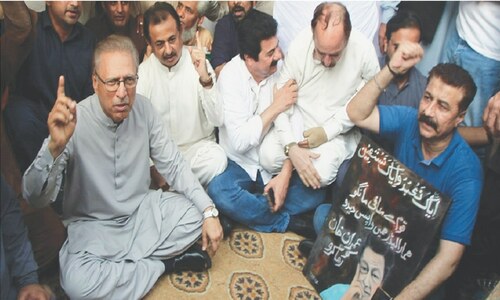Visiting Swat in winter — enjoy the dazzling beauty but take a peek into the lives of people living there.
“Wow! What beautiful scenery,” gasped my senior as we scrambled up an elevated place to enjoy a panoramic view of a valley known as Qalagay in Kabal tehsil of Swat, the area once under the influence of Maulana Fazlullah, aka ‘Radio Mullah’, now the Amir of the outlawed Tehreek-i-Taliban. The valley below was shrouded in white. Branches and twigs of tall trees were bent with loads of snow, weaving various patterns when seen from a distance. Snow on rocks and in small fields and the stream formed their own sets of designs. The rooftops of the scattered mud and timber houses had mounds of the white stuff. The peaks and ridges of the hills seemed to be trying to overawe the places below. It was white all over indeed. And, believe me, it was dazzling — literally.
But it was eerie as well; there was silence all around. It was broken only by the occasional flutter of a bird darting here and there in search of scarce food, or by the trotting of a wild animal across a stretch of terraced hills. Or by the movements of a couple of boys, men or women wrapped in warm clothes and compelled by need to venture out of their homes.
They were all united by one common imperative: the need to survive the harsh winter. And while the birds and animals make do, a chat with the local people could be depressing. For them, winter means scarcity and seclusion. Roads and pathways leading to the clusters of houses where provisions could be bought were blocked by deep snow. Kerosene, which was once a cheap commodity, was not only skyrocketing in price but was very hard to find in the area. And kerosene is lifeblood in these climes; they need it both to light their dark homes and help burn the wet logs. Those who were better off had stocked firewood and other items of use ahead of winter, but most others aren't as lucky. The main source of income in the area is agriculture, fruit farming and cattle herding, and the latter require need a lot of fodder and special care in the chilly weather.
Qalagay village is an hour-and-half’s drive from Kabal town, which is the nearest marketplace for the locals. To meet their daily needs they have to travel either to Kabal or Mingora, which is an hour and 40-minute drive away. But when it snows, the public transports these people rely on for travel no longer ply the now snow-covered roads. Qalagy is then effectively on its own.
“With no vehicles on roads, patients in serious conditions cannot be taken even to the nearest health facility,” said Yousaf Lala, a resident of Qalagay. “Likewise, animals suffering from cold-related diseases get no proper treatment.”
Rahim Shah, another resident of the same village, said that while this snow might be enjoyable for others down in the cities, “but for us it brings a lot of misery”. He was ascending the hillock to clear the snow from the rooftop of his house, which was perched on a round peak.
Qalagay sits on the road leading towards Dir district, which passes over the topmost point on the mountains. Due to heavy snow this pass remains closed for a couple of months, forcing the commuters to abandon this shorter route to Swat or Dir.
Snow on the road makes it difficult for vehicles to drive up these mountains; special arrangements such as attaching chains on the wheels is of some help, but it’s still dangerous to run a 4x4 vehicle on these tracks.
As kerosene gets expensive in proportion to the thickness of snow and fuel wood becomes scarcer, life gets tougher. But the people here have learnt to adapt to such conditions as they do not want to abandon their forefathers’ lands and live elsewhere, said Ajmeer Khan, another resident of Qalagay.
Akhtar Khan, living in a cluster of house at a distance from Qalagay is also not happy about the rising price of Kerosene. “Kerosene is too expensive thanks to the successive governments, which have made other petroleum products comparatively cheaper. But almost every item of daily use costs us much more than it costs people in towns and cities. This can mainly be attributed to lack of transport facilities.”
The recent spell of snow took a while to come but it is thick and seems set to stay for long. People are aware of climate change and anticipate harsher and longer winters in the years to come.
Dairy products are only used for food and nutrition they are also used as a means of supplementary income. Some men work abroad or in other cities of the country to help their families wrestle with the myriad problems back home.
Even when the weather relents and the snow melts people living in the highlands of Kabal tehsil have no access to medical facilities. They rely on the abundant local plants and herbs, usually dried and ground, for their common ailments.
“We use powdered ‘tamoro’, which we take with water, for abdominal pain. For fever, cough and sore throat we use different herbs,” said Akhtar Khan, living in a cluster of house at a distance from Qalagay.
“Honey, harvested from natural beehives, is considered a panacea here and is widely used for cough and flu. Newborns and toddlers are fed with it,” he added.













































